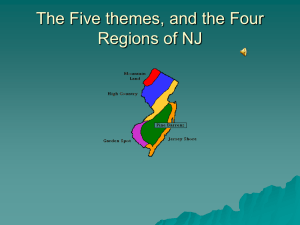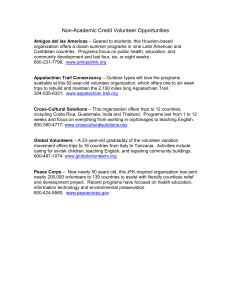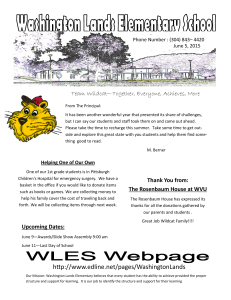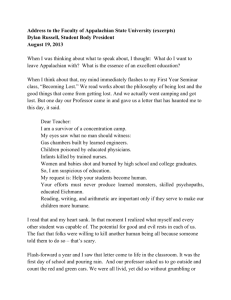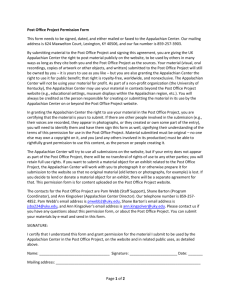The Appalachian Experience
advertisement
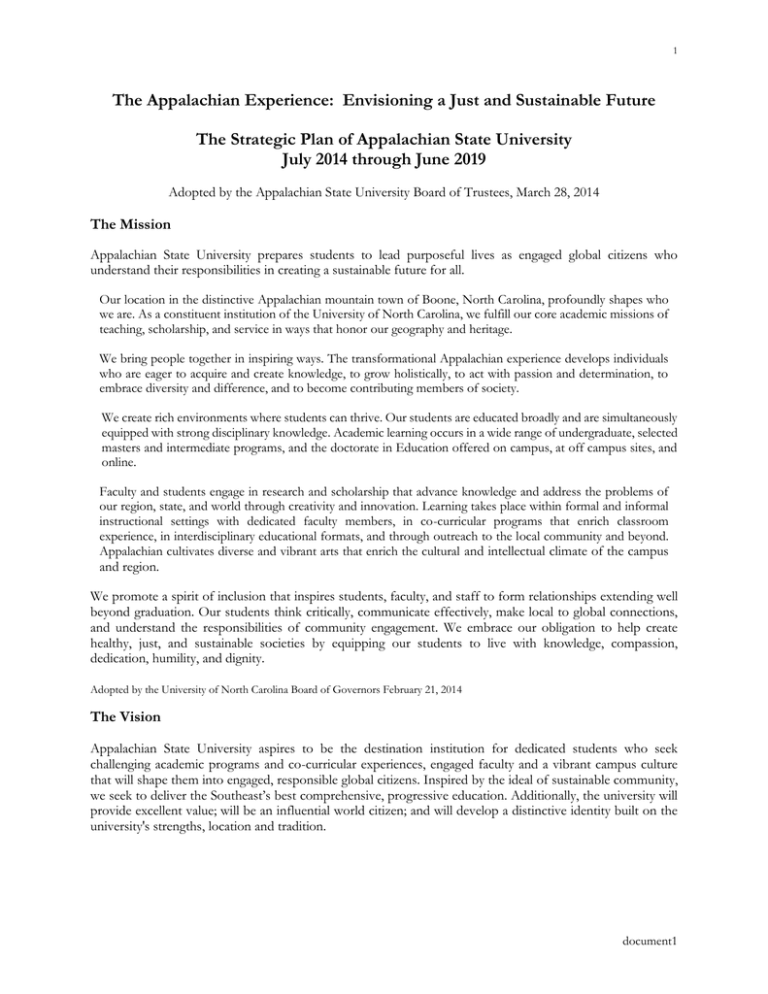
1 The Appalachian Experience: Envisioning a Just and Sustainable Future The Strategic Plan of Appalachian State University July 2014 through June 2019 Adopted by the Appalachian State University Board of Trustees, March 28, 2014 The Mission Appalachian State University prepares students to lead purposeful lives as engaged global citizens who understand their responsibilities in creating a sustainable future for all. Our location in the distinctive Appalachian mountain town of Boone, North Carolina, profoundly shapes who we are. As a constituent institution of the University of North Carolina, we fulfill our core academic missions of teaching, scholarship, and service in ways that honor our geography and heritage. We bring people together in inspiring ways. The transformational Appalachian experience develops individuals who are eager to acquire and create knowledge, to grow holistically, to act with passion and determination, to embrace diversity and difference, and to become contributing members of society. We create rich environments where students can thrive. Our students are educated broadly and are simultaneously equipped with strong disciplinary knowledge. Academic learning occurs in a wide range of undergraduate, selected masters and intermediate programs, and the doctorate in Education offered on campus, at off campus sites, and online. Faculty and students engage in research and scholarship that advance knowledge and address the problems of our region, state, and world through creativity and innovation. Learning takes place within formal and informal instructional settings with dedicated faculty members, in co-curricular programs that enrich classroom experience, in interdisciplinary educational formats, and through outreach to the local community and beyond. Appalachian cultivates diverse and vibrant arts that enrich the cultural and intellectual climate of the campus and region. We promote a spirit of inclusion that inspires students, faculty, and staff to form relationships extending well beyond graduation. Our students think critically, communicate effectively, make local to global connections, and understand the responsibilities of community engagement. We embrace our obligation to help create healthy, just, and sustainable societies by equipping our students to live with knowledge, compassion, dedication, humility, and dignity. Adopted by the University of North Carolina Board of Governors February 21, 2014 The Vision Appalachian State University aspires to be the destination institution for dedicated students who seek challenging academic programs and co-curricular experiences, engaged faculty and a vibrant campus culture that will shape them into engaged, responsible global citizens. Inspired by the ideal of sustainable community, we seek to deliver the Southeast’s best comprehensive, progressive education. Additionally, the university will provide excellent value; will be an influential world citizen; and will develop a distinctive identity built on the university's strengths, location and tradition. document1 2 Essential Character and Core Values Appalachian State University is located in the Blue Ridge Mountains, a place of great beauty and cultural and recreational opportunity. The mountains inspire an appreciation for the traditions of the region as we connect to and learn from the world. We are a teaching institution with small classes in an innovative, interdisciplinary, and integrative curriculum supported by a faculty dedicated to research and invested in new strategies and technologies. Our faculty and staff inspire our students, who have a strong service ethic and involvement in the community. The green ethos at Appalachian infuses academic programs, environmental stewardship, research, and a community with an attitude of care for the planet. The Statement of Sustainability Sustainability at Appalachian State University is not a trend, it is a tradition. We are active stewards of our State’s interconnected financial, cultural, natural, and human resources. Through engaged scholarship, we balance critical, creative and global thinking in a living laboratory, transforming theory into practice and fostering responsible citizenship. Reflections on the Appalachian Experience Joseph Bathanti, Professor of Creative Writing North Carolina Poet Laureate (2012-2014) At Appalachian State University – inspired and nurtured by the magnificent mountain chain and vast ecosystem of biodiversity surrounding it – sustainability and community are synonymous; living, intellect, and social conscience are seamless. In the pluralistic tradition of John Dewey, Appalachian students learn to fully engage daily in the ever-unfolding adventure that embodies a truly holistic education arrived at intentionally through inquiry, dialogue, and field work; and calibrated to the challenges and demands of an ever-changing world. Appalachian students study, and apprentice in, the practices that will illuminate their paths for the rest of their lives, as well as the paths of those with whom they come in contact – at local, state, national and global levels. Guided by a nationally prominent faculty that approaches teaching as a vocation, that cares profoundly about its students in and out of the classroom, Appalachian students are not merely educated, but transformed, their instincts disciplined in profoundly human and humane ways. Through a broad, inclusive array of scholarship, pedagogy, service, cultural opportunities and extracurricular involvement, they discover that, in addition to keen intellects, capacious hearts and souls are the engines of inner fulfillment, judicious action and righteous advocacy. Appalachian faculty model discriminative minds, physical and emotional wellness, and a dedicated work ethic. They respond to sensitive timely issues, that by necessity validate a democratic education, through discourse leavened with courage, compassion, an appetite for measured intellectual risk, and steadfast moral compasses. Their impact upon the lives of their students is pervasive and lasting. In this spirit of shared humanity, communal concern, and stewardship of the natural world, Appalachian State champions diversity and interdisciplinarity, solidarity through reconciliation, and moving boldly forward into the 21st century. The quest to enhance the life of the planet and its citizenry must always be imaginative, always collaborative, and innovatively cross-curricular – with an unlimited threshold to embrace and adapt to difference. That challenge must necessarily be taken up by Sciences and Technologies, by the Arts, Humanities and Social Sciences. Imagination, on the Appalachian campus, is in ample supply – among faculty, staff, and students alike with vigorous support and leadership from its administration. Our students are encouraged to dream prodigiously. document1 3 When Appalachian graduates reminisce about the glories of what happened during their stays on this campus, they do not bring up money or material wealth – though Appalachian has supplied them with an incomparable education and a degree from a stellar university that stands them in good stead intellectually, and remains the prime engine for their creature comforts. But, rather, they reflect upon something much more important: the “place” that is Appalachian State University – a place invested with a kind of mysticism, certainly mystery and wonder, a portal that opened to them at a key moment in their lives, beyond which was revealed to them the limitless possibilities for a fully realized, purposefully committed, happy life, and the fact that the human spirit, in all of its guises, is inextinguishable. Appalachian State University has never been just a college, but a rare place where students, and faculty alike, the entire university community, are not only educated and sustained, but transformed. The Plan The strategic plan titled, The Appalachian Experience: Envisioning a just and sustainable future, provides direction for the campus over the course of the next five years. The plan serves as a recognition that the primary focus of the campus is to transform the lives of our students. We believe that this transformational Appalachian Experience results in engaged citizens who understand their responsibility to society. Our students leave with a clear charge to make a difference and to care for the planet and its people. Strategic Direction 1: Creating the Transformational Educational Experience At Appalachian State University, we will continue to provide students with a transformational education by creating and maintaining intellectually challenging academic programs and extra-curricular experiences that involve them in civic engagement and community service. We will continue to positively impact student and faculty success by expanding elearning opportunities and increase access to innovative learning technologies. The Undergraduate Experience Undergraduate Education at Appalachian State University prepares students for the complexities of contemporary life. We believe that integrative learning must occur across the undergraduate experience, including the major, general education, and the co-curriculum. Undergraduate students at Appalachian State University should receive an education that prepares them for careers, post-graduate education, or other life choices. We rely on evidence-based practice to guide all aspects of the educational experience. Initiatives Metrics 1. 2. 3. Facilitate interdisciplinary and integrative approaches to teaching and learning, with new and traditional pedagogies that incorporate technology, to prepare twenty-first century students to be flexible, creative problem-solvers who can adapt to changing work requirements and life situations. Enhance academic quality and improve student retention and success through teaching excellence, effective enrollment management, and appropriate advising. Support a general education program that prepares all students for effective communication, critical and creative thinking, knowledge of the diverse world, and understanding of the responsibilities of community membership. Sustainability Data STARS 2.0 Academic Credits: Curriculum: >= 65% achievement STARS 2.0 Engagement Credits: Campus Engagement: >= 65% achievement Public Engagement: >= 65% achievement Sustainability Literacy: baseline and gain scores research design under development document1 4 4. 5. 6. Engage students in diverse experiences on campus and abroad to increase their knowledge of global issues, regions and cultures; improve their intercultural skills; and, develop attitudes that cultivate global citizenship. Develop mechanisms to broaden “sustainability” as a key learning principle in curricular offerings, faculty and staff research, campus life, and public service projects. Support and continue to develop a diverse academic curriculum that prepares students to lead engaged global citizens who understand the responsibilities of community engagement. Graduate Education We deliver quality graduate programs that promote student-faculty interactions, specialization within disciplines, collaboration between disciplines, critical analysis and reflection beyond the scope of the undergraduate curricula, with select opportunities for professional development and growth. Initiatives 1. 2. 3. Expect and support excellence in graduate education and scholarship by addressing the changing landscape of global, national, state and local needs. Enhance existing graduate programs that serve the needs of the region and the state, and develop selected new programs that serve as unique, destination programs for the university. Increase graduate student presence and support on campus, offcampus and via online programming through increased enrollments and added infrastructure. Co-curricular Learning We are committed to the continued development of a vibrant student life community that contributes to a dynamic and inclusive intellectual environment. These life changing experiences, as well as excellent support services, contribute to the mission of the University and transform our students into life-long learners who are engaged citizens locally, nationally, and globally. Initiatives 1. 2. 3. Provide services and create opportunities that empower students to make responsible life choices that enhance their health, safety, and wellbeing, through our programs, services, and facilities. Facilitate the development of our students in becoming adaptable, innovative, resilient, and engaged individuals who are active participants in their own success. Create and enhance programs, experiential opportunities, and services that support our academic mission and foster the intellectual, personal, and professional development of our students. Performance Funding Metrics Retention Rates: 89.0%, Fall ’14 cohort Graduation Rates 4‐year freshman: 44.3%, Fall 11 cohort 6‐year freshman: 68.0%, Fall ’09 cohort 4‐year transfer: 68.0%, Fall ’11 cohort Undergraduate Degree Efficiency: 23.0, ’14-15 Graduate Degree Efficiency: 51.0, ’14-15 Other Existing Collected Data Undergraduate Core Proficiencies: 2nd year students who completed GE Core at ASU have average score of 2.0 on each criterion of the Rubrics for the General Education Goals 4th year students who completed GE Core at ASU have average score of 3.75 on each criterion of the Rubrics for the General Education Goals 2nd year students show basic engagement in curricular and co-curricular experiences in at least two categories of transferable skills (under development) 4th year students show significant engagement in curricular and co-curricular experiences in at least two categories of transferable skills (under development) NSSE: >50th percentile of mean scores on Senior Engagement scale QEP: Assessment: accomplishment of QEP assessment plan and goals CLA+: “near expected” or “above expected” Sophomore Survey: >80% satisfied on all relevant items Graduate Enrollment: increase graduate enrollment 20% by ’18-19 Senior Survey: >80% satisfied on all relevant items Transfer Service Center: establishment by ’15-16 document1 5 Strategic Direction 2: Advancing Knowledge and Addressing the Challenges of Our Region, State and World through Creativity and Innovation One of the fundamental responsibilities of a university is the advancement of knowledge through research and creative activities. Two noteworthy qualities of Appalachian are the way scholarship informs teaching and how we engage our students in research. Appalachian has depth in its disciplinary research and is poised to expand its efforts to create interdisciplinary research teams focused on important local and global issues. We value the role North Carolina citizens play in the global ecosystem and society, and will increase the value and visibility of research efforts in all disciplines. Initiatives 1. 2. 3. Enhance resources, including time, to expand faculty research and creative endeavors in specific niche areas. Strategically recruit new and retain current faculty who enhance the research and scholarly mission of the University. Provide the infrastructure at the College and University level that supports increased participation of faculty and students in research and grant opportunities. Metrics Sustainability Data STARS 2.0 Academics Credits: Research: >= 65% achievement Sustainability Literacy: baseline and gain scores research design under development Other Existing Collected Data Extramural Funding: increase grants with full F&A by 3% annually; increase total grant funding to $15M by 2019 Faculty Research/Scholarship Infrastructure: fully implement Digital Measures; provide biostatistics support provided for faculty research; fund cluster hires around interdisciplinary research topics Student Research: increase number of students’ research/scholarship projects annually by 3% Scholarly and Creative Performance: increase scholarly products annually by 3% Community Engagement & Economic Development: increase related CE&ED output annually by 5% Senior Survey: >15% involved with a faculty research project Strategic Direction 3: Engaging the State, Region and World We create a culture of outreach and engagement through innovative teaching and scholarship as well as valuing engagement with varied communities. By applying our academic and professional expertise to collaborations with external partners, we improve the quality of life for the communities we serve. Through outreach, we apply our academic and professional expertise to the direct benefit of external audiences. Engagement allows us to use our professional or academic skills in collaboration with the community in ways that benefit that mutually benefit each partner. Outreach and engagement promote improving the quality of life for our university and the communities we serve. document1 6 Initiatives 1. 2. 3. 4. 5. Reward outreach and engagement in faculty and staff evaluations. Create shared learning experiences so students and graduates have an understanding of their responsibility to be contributing and productive citizens. Share faculty expertise with K-12 and community college partners to promote improved access and preparation for the university experience. Engage external stakeholders through enhanced communication and deeper relationships. Enhance efforts to promote Appalachian’s leadership in sustainability on a national level. Metrics Sustainability Data STARS 2.0 Engagement Credits: Campus Engagement: >= 65% achievement Public Engagement: >= 65% achievement Sustainability Literacy: baseline and gain scores research design under development Other Existing Collected Data NSSE: >50th percentile of mean scores on Senior Engagement scale Community Engagement & Economic Development: increase related CE&ED output annually by 5% Senior Survey: >50% participate in community service Renew Carnegie Community Engagement designation Strategic Direction 4: Embracing Diversity of Thought, Belief and Community Diversity is imperative for institutional, faculty, staff and student success. Continued assessment and planning ensures that diversity is incorporated into the fabric of the campus through its policies, administration, practice and service delivery. We are committed to fostering a community culture that is a microcosm of and responsive to the beliefs, identities, practices and values needed for constructive engagement in our increasingly global community. At Appalachian State University, diversity is recognized as an essential binding agent of the interdisciplinary approach to education, as well as to the greater life experience. Initiatives 1. 2. 3. 4. 5. 6. Continue to create programs for students, faculty and staff geared to making the campus climate equally welcoming for all members of the community. Create a reporting structure to ensure that all campus leadership groups, councils, committees, and boards model the best practices in diversity and inclusion. Implement model practices for recruitment of a diverse group of faculty, staff and students. Reward successes in increased diversity in units across campus. Improve resources and services needed to attract and support diverse faculty and students. Improve campus accessibility for individuals with disabilities. Metrics Sustainability Data STARS 2.0 Engagement Credits: Campus Engagement: >= 65% achievement Public Engagement: >= 65% achievement STARS 2.0 Planning &Administration Credits: Diversity & Affordability: >= 65% achievement Sustainability Literacy: baseline and gain scores research design under development Performance Funding Metrics Bachelor’s Degrees Awarded to Pell Recipients: 1,196 by ’14-15 document1 7 Other Existing Collected Data NSSE: >50th percentile of mean scores on “discussions with diverse others” item in Senior Engagement Indicator scale QEP Assessment: accomplishment of QEP assessment plan and goals Employee Availability & Utilization: Green Zone, or at least 80% utilization within available demographics Strategic Direction 5: Preserving Faculty and Staff Excellence Our success in accomplishing our mission requires ongoing professional and personal development of faculty and staff and sustained wellness of our employees. Employees who are healthy and well-prepared can better perform their job duties, and can also serve as strong, effective role models to students. Faculty and staff development take the form of both professional knowledge and skills as well as personal growth. Professional development ranges from acquiring new knowledge in a discipline to learning new pedagogies to acquiring new skills with technologies. Personal development includes health, wellness, and work-life balance. 1. 2. 3. 4. Initiatives Develop strong strategies to recruit and retain faculty and staff, making Appalachian a destination of choice for employment. Provide sufficient resources to support and enhance faculty and staff personal and career development. Begin an integrative wellness initiative linking faculty and staff wellness with comprehensive programs aimed at all of the wellness components (physical, spiritual, emotional, intellectual, and social) to create and sustain a strong faculty and staff. Connect staff and faculty with resources to help them with family care issues including elder care and child care. Metrics Sustainability Data STARS 2.0 Planning &Administration Credits: Health, Wellbeing & Work: >= 65% achievement Coordination, Planning & Governance: >= 65% achievement Sustainability Literacy: baseline and gain scores research design under development Other Existing Collected Data COACHE Survey: within top quartile on all benchmark scales Staff Quality of Life Survey: average >80% agree across all items document1 8 Strategic Direction 6: Building a Responsive Infrastructure for a Sustainable Campus How we employ our infrastructure, broadly defined, is critical to accomplishing our mission. Infrastructure includes both material and non-material means by which University personnel achieve our mission, encompassing both the physical facilities, and the operations, programs, business processes, organizational frameworks, and technologies we employ to sustain our campus into the future. Initiative 1. 2. 3. 4. 5. 6. 7. Establish appropriate metrics to benchmark and model organizational efficiencies. Address duplication of efforts across departments, the increasing need for paperless processing, and a general desire to streamline and simplify existing practices. Develop a technology master plan and structured process for strategic and prioritized investment in technology to support continual advancement and effective delivery of instruction, research activities and administrative processes for the university. Develop and utilize a transparent campus-wide framework of governance for information technology. Develop a sustainable campus wide funding model for information technology. Design, implement and manage an information analytics and data warehouse platform at Appalachian State University. Live our commitment to sustainability in our facilities, programing and academic offerings. Metrics Sustainability Data STARS 2.0 Operations Credits: All 9 subcategories: >= 65% achievement STARS 2.0 Planning &Administration Credits: Coordination, Planning & Governance: >= 65% achievement Investment: >= 65% achievement Sustainability Literacy baseline and gain scores research design under development Greenhouse Gas Emissions: 68,000 eCo2 by ’18-19 Energy Consumption: 90,000 Btu/GSP by ’18-19 Renewable Energy Utilization: 0.5% of total consumed energy from university-owned renewable energy systems by ‘18-19 Water Usage: 17.15 gallons/GSF by ’1819 Transportation, Single Occupant Vehicle Utilization: student rate of 85% by ’18-19 and faculty/staff rate of 28% ’18-19 Zero Waste, Solid Waste Diversion Rate: 75% by ’18-19 Performance Funding Metrics FIT: Green Zone, as defined by UNC GA Space Utilization: 1.050 by ’14-15 Other Existing Collected Data Copier use reduction: 10% by ’16-17 Desktop printer reduction: 20% by ’1617 document1 9 Paper consumption reduction: 25% by ’16-17 ECAR Student and Faculty Computing Survey: benchmark and targets for student and faculty satisfaction with technology infrastrastructure to be set Educause CORE Data Survey: a. % spending in IT transformation in central IT in top half of peers by ’18-19 b. % institutional budget spent on IT for teaching and research in top half of peers c. $ spent on IT per institutional FTE in top half of peers Educause Data Analytics Maturity Assessment: 30% more data will be available as self-serve by ’16-17 Educause Data Analytics Maturity Assessment: Data Management Maturity Model at “implemented” phase for student data by ’16-17 ITS Budget and Educause Information Security Maturity Assessment: Accomplish at least 80% of planned investment and master plan objectives by ’1819 document1
